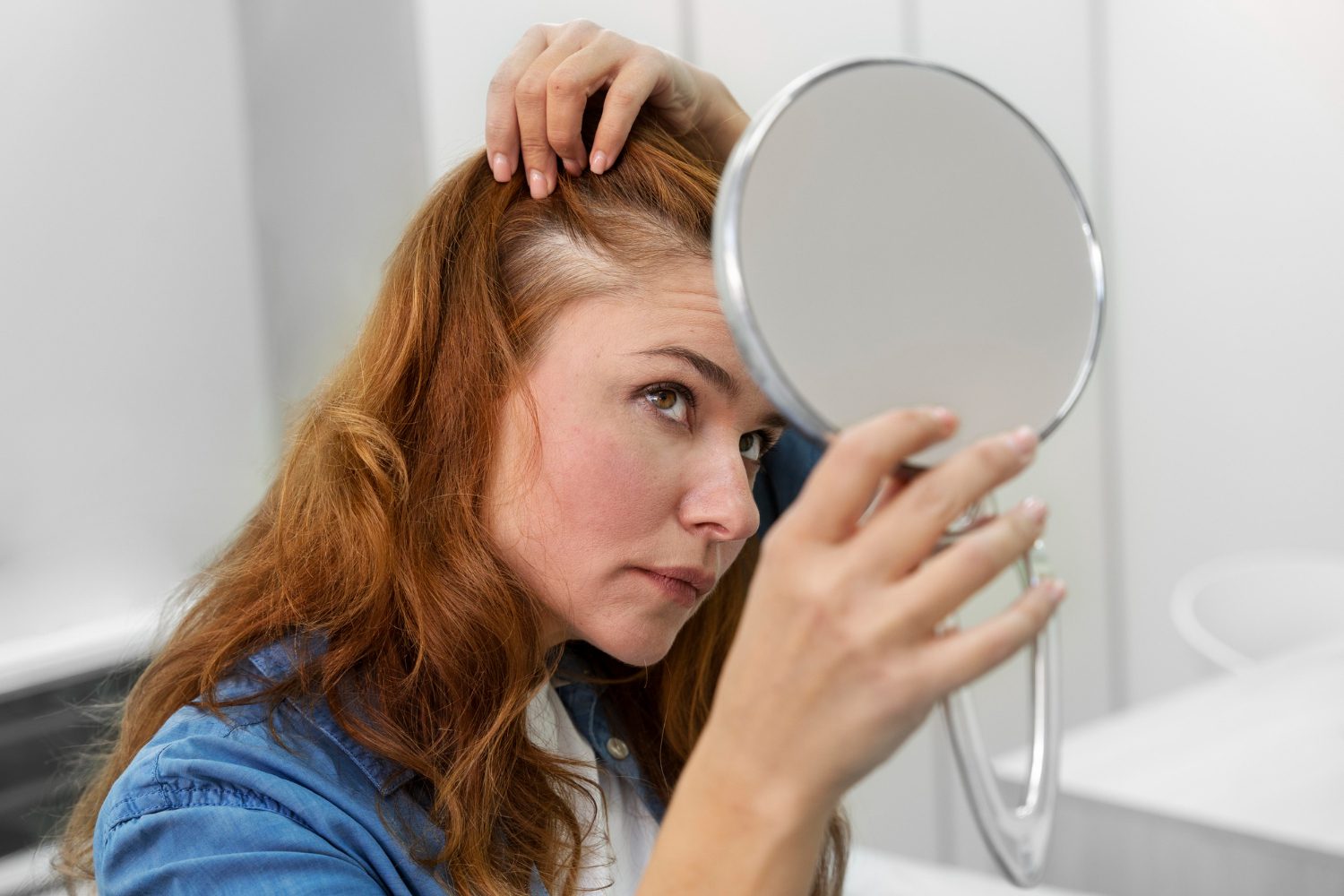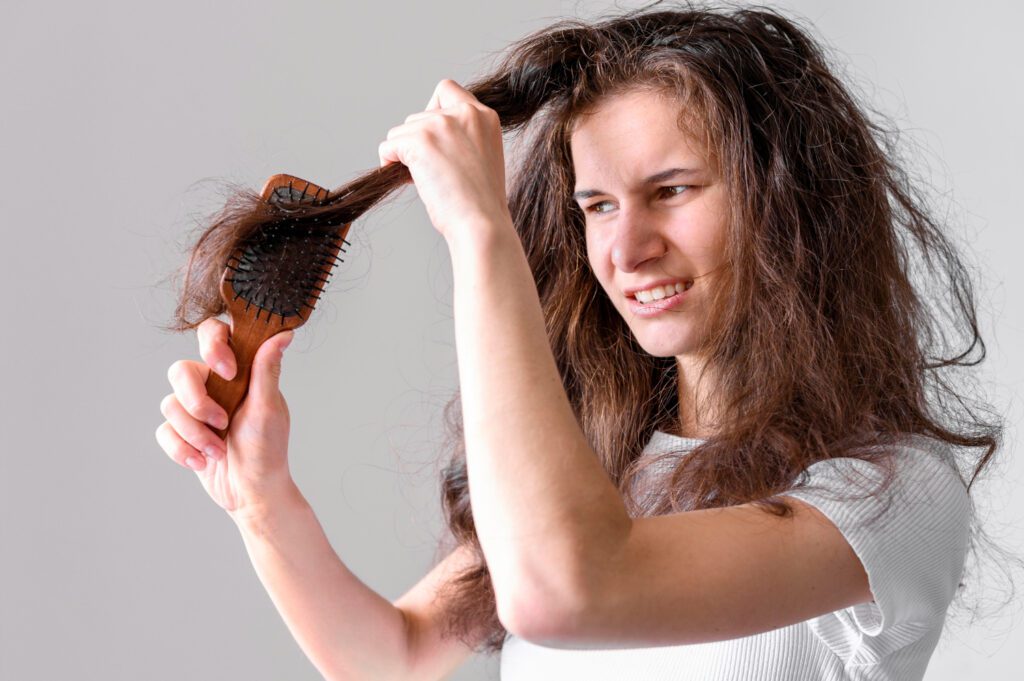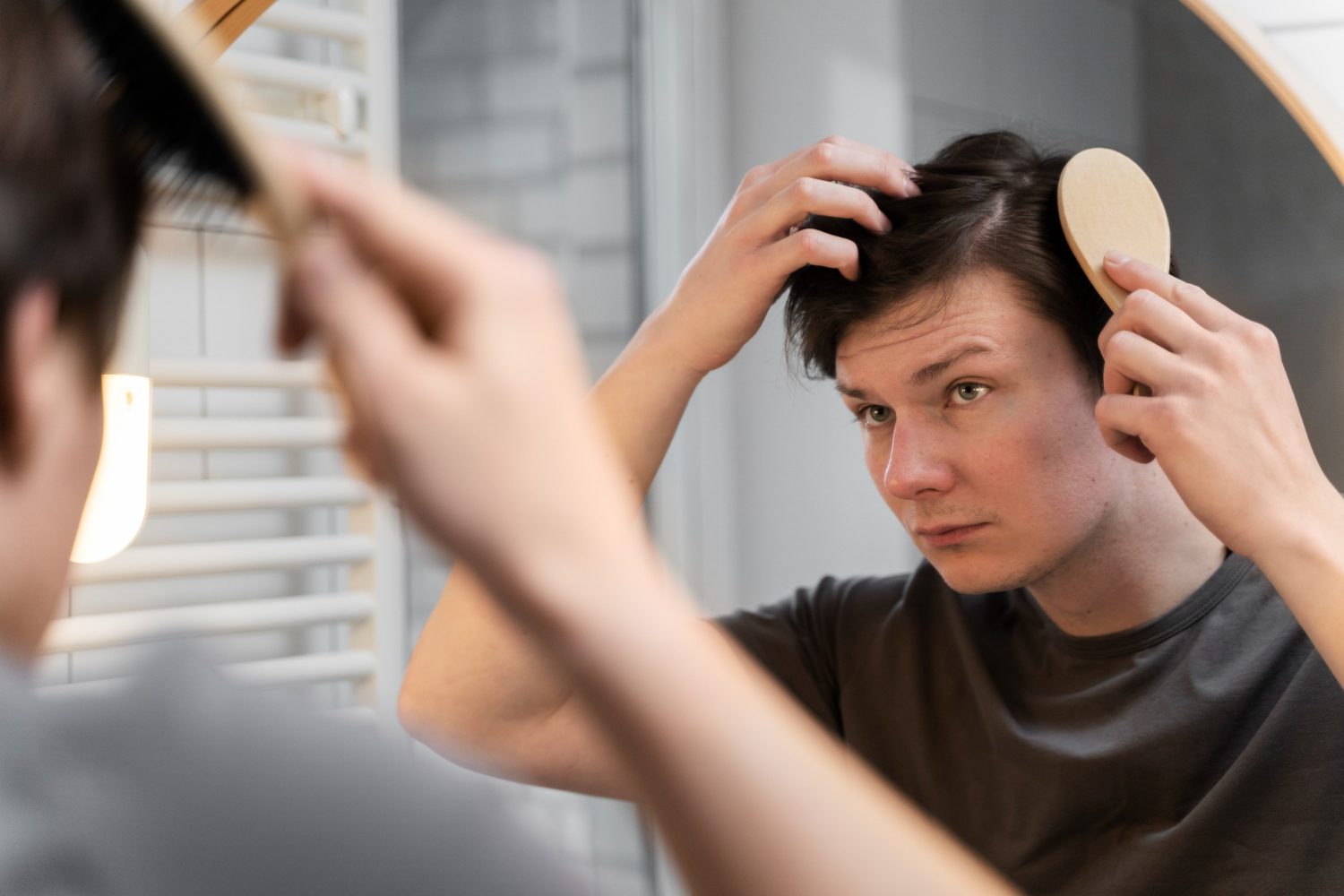
Does Vaping Cause Hair Loss? Discover the Truth Now!
admin
- 0
- 10
Vaping does not directly cause hair loss. However, the chemicals and toxins found in vaping products may contribute to hair damage and scalp issues, leading to hair loss over time.
Introduction (126 words): vaping has gained significant popularity in recent years as an alternative to traditional smoking. However, concerns have been raised regarding its potential effects on various aspects of health, including hair loss. While there is no direct link between vaping and hair loss, it is important to consider the chemicals and toxins found in vaping products.
Vaping liquids typically contain nicotine, various flavorings, propylene glycol, and vegetable glycerin, among other substances. These chemicals, when inhaled, can have adverse effects on the body, including on the hair and scalp. Some studies suggest that exposure to certain toxins and chemicals found in vaping products can lead to hair damage and scalp issues, which in turn may contribute to hair loss over time. Therefore, it is crucial to be aware of the potential risks associated with vaping and its impact on overall health, including hair health.

Table of Contents
ToggleVaping And Its Impact On Hair Health
Vaping has become increasingly popular in recent years, touted as a safer alternative to traditional tobacco smoking. However, as its popularity grows, concerns about its potential impact on health have also arisen. One particular area of concern is the effect of vaping on hair health.
Is there a connection between vaping and hair loss? Let’s delve deeper into this topic.
How Does Vaping Affect The Overall Health Of The Body?
- Vaping involves inhaling and exhaling aerosol or vapor produced by an electronic device.
- The aerosol typically contains various chemicals, including nicotine, propylene glycol, and flavorings.
- While vaping is generally considered less harmful than smoking cigarettes, it is not without risks.
- Studies have shown that vaping can have negative effects on lung health and increase the risk of cardiovascular problems.
- The chemicals present in vape aerosol can also have systemic effects on the body, affecting various organs and tissues.
Understanding The Potential Connection Between Vaping And Hair Loss.
Hair loss can be a distressing experience for both men and women. Numerous factors can contribute to hair thinning or loss, including genetics, hormonal changes, and lifestyle choices. While the research on the direct link between vaping and hair loss is limited, there are some potential mechanisms through which vaping may impact hair health.
- Nicotine: Nicotine, a key component of vape aerosol, has been shown to constrict blood vessels and reduce blood flow to certain parts of the body. Reduced blood flow to the hair follicles can inhibit their growth and lead to hair thinning or loss over time.
- Oxidative stress: Vaping has been associated with increased oxidative stress in the body. Oxidative stress occurs when there is an imbalance between the production of free radicals and the body’s ability to neutralize them. This can potentially damage hair follicles and contribute to hair loss.
- Inflammation: Some studies suggest that vaping can increase inflammation in the body. Chronic inflammation is known to disrupt the normal hair growth cycle and contribute to hair loss.
While more research is needed to establish a direct link between vaping and hair loss, it is important to consider the potential risks and make informed choices about our overall health. If you are experiencing hair thinning or loss, it is advisable to consult a healthcare professional or dermatologist who can provide personalized guidance and treatment options.
Remember, maintaining a healthy lifestyle, including proper nutrition and stress management, can also contribute to healthy hair growth.
The Science Behind Hair Thinning
Hair loss is a common concern that affects many people, and there are various factors that can contribute to this condition. One area of interest in recent years has been the potential link between vaping and hair loss. While research is still ongoing, it is essential to understand the science behind hair thinning and how factors like inflammation can play a role in this process.
Here, we will explore the hair growth cycle, factors that can disrupt it, and the role of inflammation in hair thinning.
The Hair Growth Cycle And Factors That Can Disrupt It:
- The hair growth cycle consists of three phases: Anagen (growth phase), catagen (transition phase), and telogen (resting phase).
- Various factors can disrupt the hair growth cycle, including genetics, hormonal imbalances, nutritional deficiencies, and even certain medications.
- Disruption of the hair growth cycle can lead to a reduction in the number of actively growing hair follicles, resulting in hair thinning.
Exploring The Role Of Inflammation In Hair Thinning:
- Inflammation is a natural response of the body to injury or infection, but chronic inflammation can have detrimental effects.
- Studies have suggested that chronic inflammation can contribute to hair thinning by causing damage to hair follicles and disrupting the hair growth cycle.
- Inflammatory substances, such as cytokines and prostaglandins, can induce oxidative stress, leading to hair follicle miniaturization and eventual hair loss.
How Does Vaping Contribute To Inflammation And Its Effects On Hair Follicles?
- Vaping involves the inhalation of aerosolized substances, which can contain various potentially harmful chemicals and heavy metals.
- These substances, when inhaled, can trigger an inflammatory response in the body, including the scalp.
- Chronic inflammation from vaping may disrupt the hair growth cycle and cause damage to hair follicles, leading to hair thinning.
While the link between vaping and hair loss is not fully understood, the science behind hair thinning suggests that chronic inflammation can play a role in this process. Factors that disrupt the hair growth cycle, including inflammation caused by vaping, may contribute to hair loss or thinning.
Further research is needed to fully understand the potential impact of vaping on hair health.
Chemicals In Vape Products And Their Effect On Hair
Vaping has become an increasingly popular alternative to traditional smoking. However, concerns have been raised regarding the potential effects that vaping may have on our health, including its impact on hair loss. In this blog post, we will explore the relationship between vaping and hair loss, focusing on the chemicals found in vape products and their potential effects on hair follicles and hair growth.
Examining The Harmful Chemicals Present In Vape Products:
- Propylene glycol (pg): This chemical is commonly used as a base in vape liquids. Although considered safe for consumption, there is limited research on its effects when inhaled. It may potentially irritate the scalp and hair follicles, leading to hair loss.
- Vegetable glycerin (vg): Another common ingredient in vape liquids, vg is generally recognized as safe for consumption. However, long-term exposure to vg vapors may cause dryness and dehydration in the scalp, potentially affecting hair health.
- Nicotine: While nicotine itself doesn’t directly cause hair loss, it can constrict blood vessels, reducing blood flow to the hair follicles. This lack of nourishment may contribute to weakened hair growth and thinning over time.
- Flavorings: Vape liquids often contain various artificial flavorings to enhance the vaping experience. Some studies suggest that these flavorings may contain potentially harmful chemicals, such as diacetyl and acetyl propionyl, which have been linked to lung damage. However, their specific impact on hair health remains unknown.
The Impact Of These Chemicals On Hair Follicles And Hair Growth:
- Inflammation: Chemical irritants in vape products can trigger an inflammatory response in the scalp, disrupting the normal hair growth cycle. This inflammation may lead to hair follicle miniaturization, resulting in thinning or shedding of hair.
- Disruption of the hair cycle: Vaping chemicals could potentially disrupt the natural hair growth cycle by interfering with the signaling pathways involved in hair follicle regeneration. This interference may lead to irregular hair growth patterns and reduced hair density.
- Oxidative stress: Some chemicals found in vape products have been associated with increased oxidative stress in the body. Oxidative stress can damage hair follicles and impair hair growth, potentially leading to hair loss.
Are There Specific Vape Ingredients That Are More Detrimental To Hair Health?
While more research is needed to determine the specific effects of different vape ingredients on hair health, certain chemicals like propylene glycol and vegetable glycerin may have a more pronounced impact on the scalp and hair follicles due to their direct contact.
Additionally, individuals may have varying sensitivities to different chemicals, which could influence their individual susceptibility to hair loss.
It’s important to note that the potential link between vaping and hair loss is still a relatively new area of study, and more research is needed to establish definitive conclusions. If you are experiencing hair loss or concerns, it is advised to consult with a healthcare professional or dermatologist for an accurate diagnosis and personalized recommendations.
Nicotine And Hair Thinning
Vaping has become a popular alternative to traditional smoking, with many people believing it to be a safer option. However, concerns have been raised about the potential side effects of vaping, including its impact on hair health. In this blog post, we will explore the question, “does vaping cause hair loss?
” And focus on the subheading of nicotine and hair thinning.
The Effects Of Nicotine On Blood Vessels And Circulation
- Nicotine is a key ingredient found in vaping products, and it is known to have constricting effects on blood vessels.
- When blood vessels constrict, the blood flow to various parts of the body, including the scalp, can be compromised.
- Reduced blood flow to the hair follicles can disrupt their normal functioning, leading to hair thinning or even hair loss.
How Does Compromised Blood Flow Contribute To Hair Thinning?
- Hair follicles rely on a rich blood supply to receive the necessary nutrients and oxygen for healthy growth.
- When blood flow to the scalp is compromised, the hair follicles may not receive enough nourishment, causing them to weaken and produce thinner hair strands.
- Over time, repeated exposure to nicotine and its effects on blood circulation can contribute to hair thinning and a potential increase in hair loss.
Research On The Direct Relationship Between Nicotine And Hair Loss
- While scientific studies specifically examining the direct relationship between nicotine and hair loss are limited, there is evidence that suggests a potential link.
- A study published in the international journal of trichology found that smokers had a significantly higher prevalence of hair loss compared to non-smokers.
- Although this study did not focus solely on nicotine from vaping, it does indicate that tobacco smoking, which contains nicotine, may have negative effects on hair health.
While more research is needed to better understand the specific impact of nicotine from vaping on hair loss, the constricting effects of nicotine on blood vessels and potential disruption of blood flow to the scalp suggest a possible link. Considering the importance of circulation to healthy hair growth, it may be beneficial for those concerned about hair thinning to explore nicotine-free alternatives or quit altogether.
Always consult with a healthcare professional regarding any concerns about vaping and its potential effects on hair health.
Stress, Anxiety, And Hair Health
Vaping As A Stress-Relief Mechanism And Its Impact On Hair Health
Vaping has become increasingly popular in recent years, with many people turning to it as a way to alleviate stress and anxiety. However, there are concerns surrounding the long-term effects of vaping, particularly when it comes to hair health.
Understanding The Link Between Chronic Stress, Increased Cortisol Levels, And Hair Loss
Chronic stress is known to have a detrimental impact on our overall health, including our hair. When we experience prolonged stress, our bodies release higher levels of cortisol, also known as the stress hormone. Elevated levels of cortisol can disrupt the normal hair growth cycle, leading to hair loss and thinning.
To make matters worse, the nicotine in vaping products can further exacerbate the body’s stress response, leading to even higher cortisol levels. This double whammy of stress and nicotine can be a recipe for hair loss.
Can Quitting Vaping Improve Overall Stress Levels And Potentially Prevent Hair Thinning?
Quitting vaping may have a positive impact on both stress levels and hair health. By eliminating nicotine from our bodies, we can reduce the stress on our adrenal glands, which are responsible for producing cortisol. Lower cortisol levels can help restore the hair growth cycle and prevent further hair thinning.
Moreover, quitting vaping can also have a psychological impact. People often use vaping as a coping mechanism for stress and anxiety, but this reliance on a crutch may prevent them from developing healthier coping mechanisms. By quitting vaping, individuals can explore alternative stress-relief strategies, such as exercise, mindfulness, or therapy, which can have a positive impact on both mental health and hair health.
While the link between vaping and hair loss may not be entirely straightforward, it is clear that vaping can contribute to increased stress levels, which in turn can affect hair health. Quitting vaping can help reduce stress levels and potentially improve hair thinning.
Taking care of both our physical and mental health is essential for maintaining healthy hair.
Lifestyle Factors And Hair Health
Exploring The Association Between Vaping And Other Lifestyle Habits
Many people wonder if vaping can cause hair loss. While there is limited research specifically linking vaping to hair thinning, it’s worth considering the overall impact of lifestyle habits on hair health. Lifestyle factors play a crucial role in the condition of our hair, and adopting healthy habits can support optimal hair growth.
How Smoking And Vaping May Interact And Exacerbate Hair Thinning
- Nicotine and blood circulation: Both smoking and vaping involve the use of nicotine. Nicotine constricts blood vessels, reducing blood flow throughout the body, including the hair follicles. Inadequate blood circulation can hinder the delivery of essential nutrients to the scalp, potentially leading to hair thinning.
- Toxic chemicals: Vaping involves inhaling various chemical compounds, some of which can be harmful. These toxic substances may have systemic effects, potentially impacting hair health over time. Additionally, the byproducts of vaping can contribute to oxidative stress, a known factor in hair damage.
- Inflammatory response: The chemicals present in both smoking and vaping can trigger an inflammatory response in the body. Chronic inflammation is associated with several hair conditions, including hair loss. It disrupts the natural hair growth cycle, leading to hair follicle miniaturization and eventual thinning.
The Importance Of Maintaining A Healthy Lifestyle For Optimal Hair Growth
- Nutrition and hydration: A balanced diet rich in vitamins, minerals, and proteins is essential for healthy hair growth. Antioxidant-rich foods can help counteract the oxidative stress caused by smoking or vaping. Additionally, staying hydrated supports proper scalp hydration, which promotes hair health.
- Regular exercise: Regular physical activity promotes blood circulation, helping to deliver oxygen and nutrients to hair follicles. Engaging in exercise and leading an active lifestyle can have a positive impact on hair growth and overall well-being.
- Stress management: High levels of stress can contribute to hair loss. Lifestyle habits such as mindfulness practices, meditation, and adequate sleep can help manage stress and promote a healthy hair growth cycle.
- Avoiding smoking and vaping: Quitting smoking or avoiding vaping altogether is crucial for overall health, including hair health. By eliminating these habits, you can reduce the negative effects they may have on your hair and enhance the potential for optimal hair growth.
Remember, while the direct impact of vaping on hair loss is still being studied, leading a healthy lifestyle can support hair health and potentially offset any negative effects caused by smoking or vaping. Prioritizing nutrition, exercise, and stress management can contribute to the overall well-being of your hair.
Debunking Myths: Separating Fact From Fiction
With the rise in popularity of vaping in recent years, many concerns and rumors have surfaced about its potential health effects. One of the most common questions asked is whether vaping can cause hair loss. In this section, we will address common misconceptions about vaping and hair loss and separate fact from fiction.
Addressing Common Misconceptions About Vaping And Hair Loss:
- Myth 1: Vaping directly causes hair loss
- While some individuals may experience hair loss while vaping, it is important to note that hair loss can be caused by various factors, such as genetics, hormonal changes, stress, and certain medical conditions. Vaping alone has not been proven to be a direct cause of hair loss.
- Myth 2: Chemicals in e-cigarettes lead to hair loss
- E-cigarettes contain a variety of substances, including nicotine and flavorings, but the impact of these chemicals on hair loss has not been extensively studied. Current scientific research does not provide conclusive evidence linking chemical exposure from vaping to hair loss.
Analyzing Existing Scientific Studies And Their Findings:
- Limited research on the topic
- Studies exploring the direct relationship between vaping and hair loss are scarce. Most scientific research has focused on the effects of smoking tobacco cigarettes on hair health. Therefore, it is essential to interpret the findings of these studies cautiously when discussing the potential impact of vaping on hair loss.
- Potential indirect effects
- Some researchers suggest that the nicotine found in e-cigarettes could potentially restrict blood flow to hair follicles, which might indirectly contribute to hair loss. However, more research is needed to understand the extent of nicotine’s impact and whether it differs significantly from the effects of nicotine in traditional cigarettes.
Understanding The Limitations Of Current Research On The Topic:
- Lack of long-term studies
- As vaping is a relatively recent phenomenon, long-term studies examining its potential effects on the body, including its impact on hair health, are lacking. It is crucial to recognize the limitations of current research and the need for further investigation before conclusive claims can be made.
- Individual variations
- Hair loss is a complex issue influenced by numerous factors, such as genetics, lifestyle, and overall health. It is challenging to isolate the specific impact of vaping on hair loss without considering these individual variables. Different people may experience different outcomes, making it difficult to draw universal conclusions.
While there may be anecdotal reports of individuals experiencing hair loss while vaping, it is important to approach this topic with caution and recognize the limitations of current research. If you are concerned about hair loss, it is advisable to consult a healthcare professional who can provide personalized guidance and advice based on your specific situation.
Taking Steps Towards Hair Restoration
Vaping has become a popular alternative to traditional smoking for many people. However, there have been concerns about the potential side effects of vaping, including hair loss. While there is limited research on the direct link between vaping and hair loss, several factors associated with vaping could contribute to this problem.
If you’re experiencing hair loss and suspect that vaping may be the cause, it’s important to take steps towards hair restoration. Seeking professional advice, adopting haircare tips and practices, and understanding the potential for regrowth and recovery after quitting vaping are crucial in addressing this issue.
In this section, we’ll delve into each of these aspects to help you navigate your way towards healthier and fuller hair. So let’s get started.
Frequently Asked Questions Of Does Vaping Cause Hair Loss
Can Vaping Contribute To Hair Loss?
Vaping is not directly linked to hair loss. However, certain chemicals present in e-cigarettes may affect circulation, which could indirectly lead to hair loss for those already predisposed to it.
Does Nicotine In E-Cigarettes Cause Hair Loss?
There is no direct evidence linking nicotine in e-cigarettes to hair loss. However, nicotine can constrict blood vessels, potentially affecting blood flow to hair follicles and contributing to hair loss over time.
Are The Chemicals In E-Cigarettes Harmful To Hair Growth?
Some chemicals present in e-cigarettes, such as formaldehyde and acrolein, can be harmful to overall health. While there is limited research specifically focusing on their impact on hair growth, it is advisable to avoid excessive exposure to these chemicals for overall well-being.
Can Secondhand Vapors From E-Cigarettes Cause Hair Loss?
There is currently no evidence suggesting that secondhand vapors from e-cigarettes can cause hair loss. However, exposure to them may still have unknown effects on general health and well-being.
Can Quitting Vaping Help Prevent Hair Loss?
If hair loss is caused or aggravated by chemicals present in e-cigarettes, quitting vaping may help improve circulation and overall health, thus potentially reducing the likelihood of hair loss. However, individual results may vary, and consulting a healthcare professional is recommended.
Conclusion
The question of whether vaping causes hair loss remains a topic of debate. While there seems to be a correlation between vaping and hair loss, it is important to note that there are still numerous factors at play. Stress, nutrient deficiency, and genetic predisposition are all key factors that contribute to hair loss.
However, the chemicals and toxins present in e-cigarettes and vaping products may also have an impact on hair health. It is crucial to prioritize overall health and wellness, which includes avoiding tobacco and vaping products. If you are experiencing hair loss, it is recommended to consult with a healthcare professional who can provide personalized advice and guidance.
Remember, taking care of your hair goes beyond avoiding vaping; it also involves maintaining a balanced diet, managing stress levels, and using appropriate hair care products.



